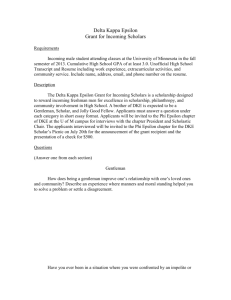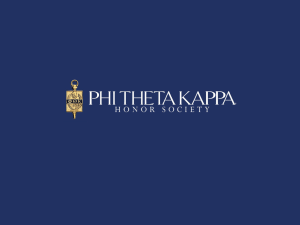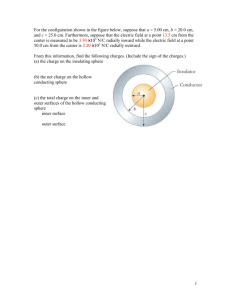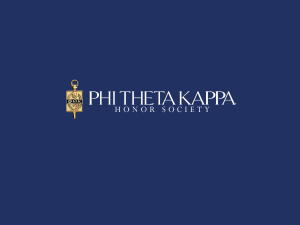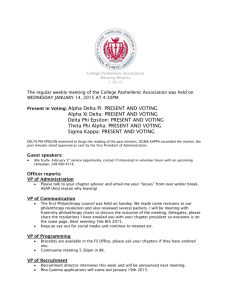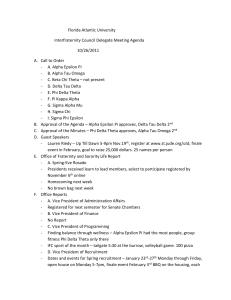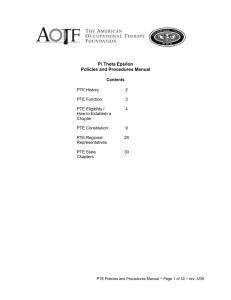PHI ALPHA THETA NATIONAL HONOR SOCIETY EPSILON
advertisement
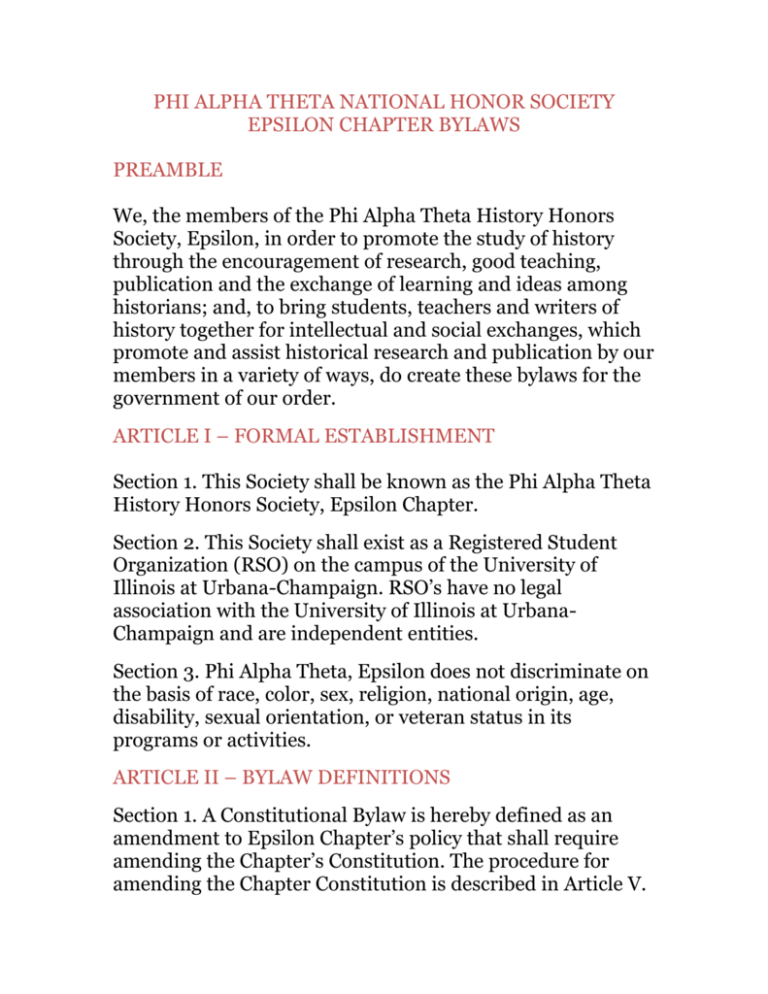
PHI ALPHA THETA NATIONAL HONOR SOCIETY EPSILON CHAPTER BYLAWS PREAMBLE We, the members of the Phi Alpha Theta History Honors Society, Epsilon, in order to promote the study of history through the encouragement of research, good teaching, publication and the exchange of learning and ideas among historians; and, to bring students, teachers and writers of history together for intellectual and social exchanges, which promote and assist historical research and publication by our members in a variety of ways, do create these bylaws for the government of our order. ARTICLE I – FORMAL ESTABLISHMENT Section 1. This Society shall be known as the Phi Alpha Theta History Honors Society, Epsilon Chapter. Section 2. This Society shall exist as a Registered Student Organization (RSO) on the campus of the University of Illinois at Urbana-Champaign. RSO’s have no legal association with the University of Illinois at UrbanaChampaign and are independent entities. Section 3. Phi Alpha Theta, Epsilon does not discriminate on the basis of race, color, sex, religion, national origin, age, disability, sexual orientation, or veteran status in its programs or activities. ARTICLE II – BYLAW DEFINITIONS Section 1. A Constitutional Bylaw is hereby defined as an amendment to Epsilon Chapter’s policy that shall require amending the Chapter’s Constitution. The procedure for amending the Chapter Constitution is described in Article V. Section 2. A Customary Bylaw is hereby defined as an amendment to Epsilon Chapter’s policy that shall not require amending the Chapter’s Constitution. Examples include the founding of a new committee, changes in recruitment policy, and discretionary spending on scholarship programs, journal publications, and events. ARTICLE III – PARTICIPATION AND MEMBERSHIP Section 1. Membership Definitions A. As a result of our chapter’s registration as a RSO, our rules for membership are defined within RSO guidelines. Therefore, our chapter members may only consist of people with an active illinois.edu e-mail account. B. Members do not need to be history majors to participate or seek induction, nor shall membership in another society or association disqualify anyone from seeking induction. C. Our membership is divided into two classes: informal members and formal members. Informal members are defined in Article III, Section 1, Subsection D; formal members are defined in Article III, Section 1, Subsection E. D. Informal members are people who participate in Epsilon Chapter activities, but have not been formally inducted into the Society. Informal members do not necessarily ever need to fulfill the requirements for induction set forth by the national organization of Phi Alpha Theta and the Epsilon Chapter, but they are expected to uphold the respective values of the national organization and the Epsilon Chapter, nonetheless. E. Formal members are people who have been inducted into the Epsilon Chapter under the criteria set forth by the national organization. The criteria are defined in Article III, Section 2, Subsection A. Formal members are eligible to receive honor cords at graduation if they have additionally amassed fifty (50) points from the Epsilon Chapter. Further details regarding points can be found in Article III, Section 3. Section 2. Requirements for Induction A. Potential formal members must have at least twelve (12) hours of credit in history from an accredited university, at least a 3.0 overall grade point average (GPA), and at least a 3.1 GPA in history courses from an accredited university. B. Informal members without a good standing, as defined in Article III, Section 3, Subsection D, shall not be allowed to become formal members through induction until they achieve good standing. Section 3. Events and Points A. Points are an essential component of the Epsilon Chapter. As it is subject to change, the point values are defined as a customary bylaw. The existence of points as the definitive measure of monitoring participation in the Epsilon Chapter; however, is a constitutional bylaw. B. Points shall be awarded to members who participate in the Chapter’s monthly activities and committees. All members must earn at least fifty (50) points by the time they graduate in order to receive honor cords at Commencement. C. Both formal and informal members can earn points. Points earned as an informal member will transfer if an informal member is inducted into the Chapter as a formal member. Only formal members can graduate with cords; however, and informal members must be inducted into the Chapter prior to their graduation to receive them. D. All members must attend two (2) general meetings per semester. If a member fails to fulfill this requirement, his or her points earned during the semester in question will be considered invalidated. This requirement can be waived under the discretion of the executive board in extraordinary circumstances. Attendance at the required general meetings does not earn points; however, attendance at additional general meetings beyond the requirement will earn points. Fulfillment of this requirement results in the member being considered in “good standing.” E. Any member can request points be given for attendance at a non-Chapter event. He or she must receive approval from the executive board for the event to be a point opportunity before the event takes place. F. All point opportunities will be posted for members on the Epsilon Chapter's website and shall be addressed in an email. A record of points shall also be made available on a consistent basis on the Chapter’s website. G. Points will be assigned as follows: Additional General Meetings beyond the requirement 1 point Social events and approved non-Chapter events 1 point Annual Events (Induction and Awards Reception) 2 points Attendance at Writing Workshops .5 points per hour Tutoring at Writing Workshops 1 point per hour Executive Board Membership 20 points Committee Chairmanship 1-10 points* Committee Membership 1-7 points† *At the discretion of the Vice President. †At the discretion of the Committee’s Chair. ARTICLE IV – THE EXECUTIVE BOARD Section 1. Positions and Duties of the Executive Board A. The officers of the Chapter shall be the president, the vice president, the treasurer, the secretary, the historian, and the director of public relations. B. The executive board is responsible for setting the agenda and schedule for the Chapter. Each member of the executive board has distinct executive roles, but together they form the legislative and judicial duties for the Chapter. C. The executive board has full power to establish and eliminate committees when deemed necessary. D. Any decision made by the executive board can be reversed by the general membership if at least 25 percent of the members present at a general meeting oppose a decision. This opposition shall result in immediate arbitration using randomly selected neutral members as arbitrators. Section 2. Duties of the Executive Board Members A. The president shall have full executive authority over the Chapter. In this capacity, the president must sign off on all legal, constitutional, and budgetary documents. Additionally, it is the duty of the president to maintain communication with the Director of Undergraduate Studies and any additional administration officials with an involvement in the Chapter. The president will delegate his or her powers when needed and shall temporarily take up the duties of any officer who resigns until a replacement is appointed. Finally, the president will officially induct Chapter members and preside at all meetings. B. The vice president is effectively in charge of committees. It is his or her duty to ensure that every committee has a chair and to meet with these chairs on a regular basis. Typically, the vice president shall chair at least one of the committees by him or herself. Additionally, the vice president is responsible for overseeing any changes to the Chapter bylaws and may choose to start a committee on the bylaws if there is deemed a need to change them. If for any reason the president has to step down, the vice president takes over presidential duties for the remainder of the term. C. The treasurer's job is to keep a record of the Chapter’s financial accounts. The treasurer shall present regular reports of disbursements and deposits to the Executive Board. In the event the chapter requires money for events, the treasurer shall request it from SORF for the University of Illinois Registered Student Organization Board. Most importantly, the treasurer must keep the original financial documents in trust with the Faculty Advisor at the Office of the Director of Undergraduate Studies. D. The secretary is in charge of taking down the minutes of both the Chapter general meetings and executive board meetings. These minutes are to be posted on the Chapter’s communication outlets for the general membership to reference. The secretary also keeps track of both points and standing within the Chapter and shall make sure to post a record of Chapter points on a consistent basis. E. The historian is the official record keeper for the Chapter and is; therefore, responsible for producing the two annual publications from the Chapter, the scrapbook and the undergraduate journal. The historian is the default chair of both of these committees, but he or she may vacate control of one of these committees to another member if he or she wishes to. In addition to the two Chapter publications, the historian is responsible for organizing conference trips and researching scholarship opportunities. F. The director of public relations is responsible for all direct communication between the executive board and the Chapter membership. The director of public relations; therefore, is in charge of the Chapter e-mail account, website, and social media outlets. The director of public relations is also in charge of producing all fliers regarding events and arranging groups to chalk buildings with classes that have significant history or history related classes. Section 3. Election of the Executive Board A. Any member, whether formal or informal, that is in good standing and can serve out his or her sought position for an entire term, may serve as a member of the executive board. B. Nominations for executive board shall take place at the second to last meeting of the second semester. Elections shall take place at the final meeting of the second semester. C. Any member may nominate an eligible member for an executive board position. Self-nominations are also allowed. All nominations must be seconded. The proposed nominee must accept his or her nominations for them to appear on the ballot. D. Members can be nominated for multiple positions, but can only be elected to one position. Once they are elected to an office, they are removed from the ballot for all other nominated positions. E. Officers of the executive board are elected to one-year terms and are eligible for re-election. Our Chapter does not allow members to run for third terms in a single office. F. Elections shall proceed in order of seniority, with the election for president coming first and the election for director of public relations coming last. G. Election results shall be counted by the two most senior members of the executive board that are not running in any elections. If there are not two executive board members who comply with this requirement, the Director of Undergraduate Studies, in his or her capacity as Chapter advisor, shall be responsible for the vote count. Section 4. Removal and Replacement of Executive Board Officers A. An executive board member can be removed either by a petition with the signatures of over 50% of the membership or by a unanimous vote by the executive board (excluding the officer in question) to remove one its own members. B. If an officer is removed from office, or if he or she resigns, the executive board shall appoint a successor to serve out the remainder of the term. This does not apply to the president, who is replaced automatically by the vice president. ARTICLE V – AMENDMENT PROCEDURE Section 1. A quorum of at least 10 percent of the General membership shall be required for passage of Executive Board or Committees memorandum. Failure to garner a quorum will cause the said memorandum to become customary bylaws without a vote. Section 2. A quorum of at least 50 percent of the General Membership shall be required for passage of amendments to the Epsilon Chapter Constitution. Failure to garner a quorum at the next General Meeting will table the Amendment motion until the next meeting. ARTICLE VI - CHAPTER RESPONSIBILITIES PER THE NATIONAL HISTORY HONOR SOCIETY, PHI ALPHA THETA, INC. Section 1. Each active chapter shall adopt its own Bylaws (which shall conform to the provisions of the National Phi Alpha Theta Constitution) and shall submit a copy of the same to National Headquarters. Section 2. Each Chapter shall elect officers annually, according to its Bylaws, and the newly elected Chapter secretary shall notify National Headquarters promptly of the results of the election. Each Chapter shall have a faculty advisor, who shall be responsible for the conduct and well being of said Chapter.

